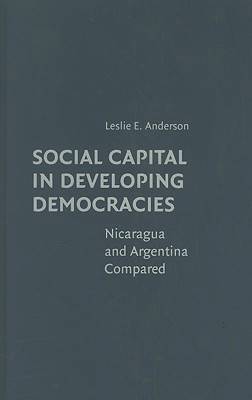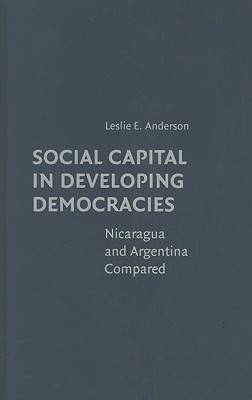
- Afhalen na 1 uur in een winkel met voorraad
- Gratis thuislevering in België vanaf € 30
- Ruim aanbod met 7 miljoen producten
- Afhalen na 1 uur in een winkel met voorraad
- Gratis thuislevering in België vanaf € 30
- Ruim aanbod met 7 miljoen producten
Zoeken
Social Capital in Developing Democracies
Nicaragua and Argentina Compared
Leslie E Anderson
Hardcover | Engels
€ 122,95
+ 245 punten
Uitvoering
Omschrijving
Drawing on extensive field work in Nicaragua and Argentina, as well as public opinion and elite data, Leslie E. Anderson's Social Capital in Developing Democracies explores the contribution of social capital to the process of democratization and the limits of that contribution. Anderson finds that in Nicaragua strong, positive, bridging social capital has enhanced democratization, while in Argentina the legacy of Peronism has created bonding and non-democratic social capital that perpetually undermines the development of democracy. Faced with the reality of an anti-democratic form of social capital, Anderson suggests that Argentine democracy is developing on the basis of an alternative resource - institutional capital. Anderson concludes that social capital can and does enhance democracy under historical conditions that have created horizontal ties among citizens, but that social capital can also undermine democratization where historical conditions have created vertical ties with leaders and suspicion or non-cooperation among citizens.
Specificaties
Betrokkenen
- Auteur(s):
- Uitgeverij:
Inhoud
- Aantal bladzijden:
- 344
- Taal:
- Engels
Eigenschappen
- Productcode (EAN):
- 9780521192743
- Verschijningsdatum:
- 8/03/2010
- Uitvoering:
- Hardcover
- Formaat:
- Genaaid
- Afmetingen:
- 142 mm x 216 mm
- Gewicht:
- 408 g

Alleen bij Standaard Boekhandel
+ 245 punten op je klantenkaart van Standaard Boekhandel
Beoordelingen
We publiceren alleen reviews die voldoen aan de voorwaarden voor reviews. Bekijk onze voorwaarden voor reviews.







